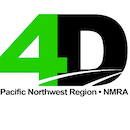Rich Blake
This is a great period piece with a fair amount of humor that only makes sense in the 1950s era. It uses the example of a family’s busted TV to teach railroad employees to properly handle cargo during rail car shipping.
But this film should also make model railroad operators think about how you handle your switching operations. Do you back the loco into the string and keep going without stopping to check the couplings? Do you bash into strings and then take off in the other direction without allowing time to connect brake hoses and check couplings? Do you speed over turnouts to get to the runarounds because there is a lot of free track? Do you think about where your brakemen are located or where they must be dropped off or picked up by the engine or caboose? How many times have you backed into a string so soft and easy that only the couplers move as they connect? Or, when you back into a string does everything move an inch? What is “an inch” in your scale?
I’ve seen many cases, including myself, where operators get in a hurry or don’t pay attention that result in rough car handling and/or derailments.
This film illustrates these bad habits in 1:1 scale and emphasizes that we all need to slow down and go easy on the equipment. You never know what precious cargo is in there!
If the video doesn’t appear below, click this link to watch it on YouTube: http://youtu.be/nlzTqPfHrAI
Editor’s Note: Watching this film made me realize just how much things have changed in the past 60 years:
- You had friends over when you got a new TV
- Your wife baked them a cake
- Your wife baked
- He saved his money before buying something
- It was “his” money
- Men stood in line to get paid
- They got something called a “check”
- Multiple people were going to watch a 21″ screen
- The wife and daughter shopped for groceries
- TVs arrived via railroad
- The shop delivered
- She grocery shopped in heels and a dress
- The daughter wore black shoes and white socks
- He wore a coat
- The deliveryman’s handcart has 3” wheels
- TVs were made inChicago
- TVs had tubes. And wires.
- TVs came in wood cabinets
- With doors
- TVs were shipped in boxcars
- There were no forklifts in freighthouses
- Switches were thrown by hand
- Switchstands had kerosene lanterns
- A “fellow’s wife thinks he does his job just right”
- Livestock traveled by rail
- Airplanes had propellers
- Radios were the size of backpacks
- Ice was used for cooling
- Companies made slow-moving movies like this for training
It makes you wonder how different things will be 60 years from now!
– Al Lowe

No Comments Yet